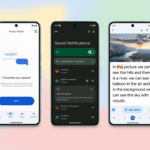Our belief is that technology can be a tool to empower children, teenagers, and families to explore, learn, and grow online in a safe manner. We have been dedicated to providing high-quality online experiences tailored to different age groups, understanding that how younger children interact with technology differs greatly from teenagers. We respect that each family has its unique relationship with technology.
Today, we are bringing together experts from various sectors at the “Growing Up in the Digital Age” summit hosted at the Google Safety Engineering Center (GSEC) in Dublin. The objective is to continue discussions on crucial topics related to safeguarding young individuals online, including enhancing privacy and safety measures, promoting healthy digital behaviors, and assisting teenagers and families in navigating new technologies like AI confidently and securely.
During the summit, we will share updates on our collaborations with experts in the field, insights gained from these partnerships, and advancements in our safeguards, tools, and customized online experiences for families. Here are some key highlights.
Empowering Children and Teens Online through Collaborative Efforts
We have a rich history of collaborating with partners such as child development specialists, educators, researchers, and NGOs to promote the safety and empowerment of children and teenagers online.
To boost media literacy and expand online safety initiatives in Europe, last year, Google.org allocated over €8M in grant funding to NGOs, with a focus on supporting underserved youth, including refugees, young people with learning disabilities, and those from marginalized or remote areas. These initiatives are expected to benefit 2.7 million young individuals in Europe. Grants were allocated to organizations like Barnardo’s in Ireland to enhance their Online Safety Program for kids and teens with updated content on AI, and Génération Numérique in France to educate 15,000 underserved teenagers on AI and misinformation.
This year, Google.org has committed an additional €5M to help teenagers understand AI for safe usage, as part of the earlier commitment to support AI training and skills in Europe. We will assist organizations targeting underserved teens and their support systems, including educators and parents.
We are looking forward to potential future collaborations with the United Nations Children’s Fund (UNICEF) to research how industry and civil society stakeholders can better support the implementation of the best interests of the child in digital environments. More information will be shared in the upcoming weeks.
Emphasizing Child Safety
For years, we have partnered with researchers, civil society groups, and other entities focusing on child safety. Our child safety toolkit aids numerous partners, including the National Center for Missing and Exploited Children (NCMEC), in identifying potentially harmful content across billions of files. It allows the evaluation of millions of images and videos for abusive behavior annually. Additionally, we offer a dedicated child safety channel within our Priority Flagger Program for qualified organizations like NGOs to report content that violates our policies and Community Guidelines. We also support research in this domain, such as through the T&S Research Grant, enabling academics to propose solutions for better child protection.
Assisting Families with Navigating the Digital World and New Technologies
We continuously seek ways to aid families in finding a healthy balance with technology. A crucial aspect is providing parents with tools and resources to manage their children’s online time and engage in dialogues about the pros and cons of technology.
Through Family Link, we offer user-friendly controls for parents to establish digital rules for their children, enabling them to set screen time limits, manage apps, or track their child’s location with ease. Recently, we have streamlined the process for parents to view and adjust their child’s settings. By simply searching for “parental controls” in their Google Account, parents can locate a dedicated information box listing their supervised accounts with quick access to each account’s settings.
Everything we do for children, teenagers, and families is aimed at empowerment, respect, and protection. We are committed to advancing this vital work in collaboration with experts in the field.









